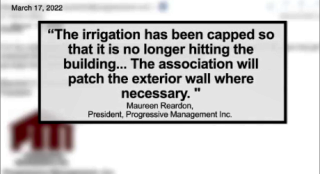Florida homeowner without insurance while trying
to close previous mold claim
Palm Harbor homeowner whose
insurance went into receivership this year is waiting for her
homeowner's association to help with mold claim |
|
Article Courtesy of ABC ACTION NEWS
By STACY Olmos
Published
September 23, 2022
|
WATCH VIDEO |
WHAT IS THE PRICE OF PARADISE?
As Tampa Bay continues to attract new residents and
businesses, the impact of living in paradise comes at a cost for all of
us— from the increasing cost of housing and infrastructure to utilities
and insurance. ABC Action News is committed to helping you and your
family make the most of your money and navigate through the Price of
Paradise.
|
It’s hurricane season in Florida, and the
reality is that some homeowners who had existing claims with
insurance companies that have gone into receivership are
still without coverage while previous claims are still open.
In March, we met Palm Harbor homeowner Judy Slater who
discovered mold in several places in the condo at El Pasado
that she had recently moved into. She had opened a claim
with her property insurance, Avatar, which went into
liquidation shortly after. Her claim became one of the
thousands that the Florida Insurance Guaranty Association (FIGA)
had to pick up from companies that’d gone under.
Mold remediation
Now it’s September, the height of hurricane season, and
Slater’s home isn’t covered by any property insurance.
|
|
Waiting for her homeowner's association to help with
mold claim.
|
“Til the claim is closed, there's no insurance. And
then, once we get the finalization that the claim is closed and I get
the documentation to show the claim is closed, then I can get
insurance,” Slater explained. “From talking to one of the insurance
companies, I was initially told that as long as I have a contract that
they can proceed to an insurance. I've been ghosted.”
Ghosted means they’ve stopped talking to her, which would make sense for
a company that doesn’t want to take on a home with pre-existing issues.
On September 1, Slater pulled money from her 401k to get the mold
remediation done.
We went to meet the remediation company to see how big the job was, and
it turns out it was a lot more mold than they anticipated.
“There’s different containments… we have one for that exterior wall and
we have another one for the bathroom,” Florida’s Elite Restoration
Co-Owner Josh Martin said.
He used to be an insurance adjuster and started this business to help
people with water damage, not knowing most of his work would be just
like Slater’s condo.
“Probably… 80 to 90% of every job we do ends up being a mold job
because, by the time we get to it, you pull back the baseboards, you
look at the cabinetry, there's mold everywhere,” Martin said.
He added that he’s seen many homeowners and associations that don’t
understand their responsibility.
“People just kind of presume I think that every insurance policy is the
same, and it's not,” Martin exclaimed. “There's 10K water caps now that
are popping up everywhere… Or even your deductibles. Like for example,
State Farm has a percentage deductible… you file a claim and you have a
$14,000 deductible when your kitchen could cost $14,000.”
In Slater’s case, we looked up the Florida Condominium Act which states
a homeowner’s association is responsible to maintain “common elements”
such as the roof and exterior walls shared with other units.
We then spoke with a Florida attorney who represents homeowners in cases
like Slater’s, who said an outside sprinkler causing water to eat at
paint and get into drywall would be water intrusion from a common
element, which could legally be the HOA’s responsibility.
Unfortunately, Slater’s condo did not pass its first air test after
remediation, so the company will keep working until they find all of the
mold.
“I'm glad you're in my corner, but if somebody's going through this,
they have to be their own advocate… they can't give up,” Slater said.
Three important lessons for any homeowner to keep in mind:
-
When buying a home, inspectors look for water
damage, not necessarily mold
-
Know your property insurance company and the
details in your coverage
-
If you have an HOA, read the declaration and know
what their responsibilities are
|
